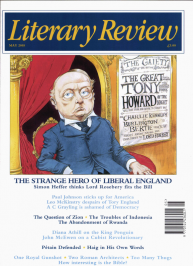Donald Rayfield
The Manufacture of A Martyr
Comrade Pavlik: The Rise and Fall of a Soviet Boy Hero
By Catriona Kelly
Granta 354pp £17.99
Every ideology needs its child martyr, preferably an adolescent butchered by his nearest and dearest for the intransigent assertion of a new faith. The Christian Church must have accumulated hundreds, and even the Nazis had Quex and Horst Wessel. It took the Soviets fifteen years after their revolution to find Pavlik Morozov, and to immortalise him, at least for the next fifty-five years, as an example to all good children and a warning to all bad parents. The story, legend or myth of Pavlik Morozov now exists in three versions. The first – official – version was developed from newspaper reports and Ogpu propaganda by a number of Soviet writers, notably Maxim Gorky, and portrays Pavlik as an enlightened and energetic youth who, for all the backwardness of his surroundings (a remote village on the borders of the Urals and Siberia), is so devoted to socialist principles that he denounces his own father for helping dispossessed rich farmers (the kulaks) and continues to harass all those who hide grain and other possessions from the State. In revenge, his own cousins and paternal grandparents waylay him in the forest, where he is gathering cranberries, and butcher him and his little brother. The local police (ordinary and secret), with the help of activists and journalists, quickly solve the crime, and hold a show trial of the murderous relatives. The murderers and their accomplices are shot. The boy becomes a secular saint.
Revolting though the saga was, it remained plausible enough not to be seriously questioned, even by those parents who from then on had to worry every night about what their child might say in school the next morning. And right until the end of the 1980s, teachers would instruct children

Sign Up to our newsletter
Receive free articles, highlights from the archive, news, details of prizes, and much more.@Lit_Review
Follow Literary Review on Twitter
Twitter Feed
It wasn’t until 1825 that Pepys’s diary became available for the first time. How it was eventually decrypted and published is a story of subterfuge and duplicity.
Kate Loveman tells the tale.
Kate Loveman - Publishing Pepys
Kate Loveman: Publishing Pepys
literaryreview.co.uk
Arthur Christopher Benson was a pillar of the Edwardian establishment. He was supremely well connected. As his newly published diaries reveal, he was also riotously indiscreet.
Piers Brendon compares Benson’s journals to others from the 20th century.
Piers Brendon - Land of Dopes & Tories
Piers Brendon: Land of Dopes & Tories - The Benson Diaries: Selections from the Diary of Arthur Christopher Benson by Eamon Duffy & Ronald Hyam (edd)
literaryreview.co.uk
Of the siblings Gwen and Augustus John, it is Augustus who has commanded most attention from collectors and connoisseurs.
Was he really the finer artist, asks Tanya Harrod, or is it time Gwen emerged from her brother’s shadow?
Tanya Harrod - Cut from the Same Canvas
Tanya Harrod: Cut from the Same Canvas - Artists, Siblings, Visionaries: The Lives and Loves of Gwen and Augustus John by Judith Mackrell
literaryreview.co.uk